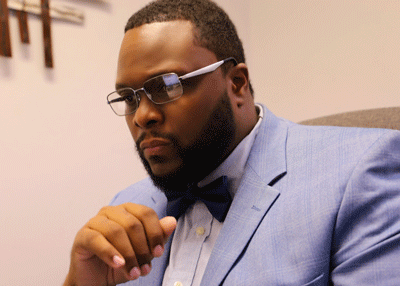Tsanonda Edwards, co-founder and director of Community Engagement for Above it All, a mental health and psychiatric rehabilitation program for Baltimore youth and their families knows all too well how difficult it is to deal with the mental health effects of trauma and loss.
So when Al Wiley, owner of Wiley Funeral Homes approached him and a group of his close friends with the charge to create an organization to help interrupt the behaviors and criminal activity that many Baltimore youth engage in which lead to their deaths, they decided to start an organization that provides therapeutic services, as well as community programs that teach life skills, promote self-love, personal values and offer positive self-talk.
These services are dear to Edwards, a Baltimore native and graduate of Morgan State University and the University of Baltimore, who says for many years he wore a mask, replete with a smile because it was what was expected, even though he was experiencing “mental and emotional obstacles” that inhibited his growth as a man. These words, from the introduction to his book, “The Extraordinary Mr. Nobody: A Beginner’s Guide to Self-Healing,” capture the challenges many people face when they suppress trauma instead of addressing it.
Edwards wrote his book long before it was published. It helped him get much of what he was feeling out, but the fear of being vulnerable about his struggles with depression, anxiety and managing relationships stifled his journey to becoming an author and advocate for mental health treatment.
What he now calls a divine connection with a therapist at a middle school where he taught not only led to him getting his book published, it was also the beginning of therapeutic services that changed his life. He shared an office with the school therapist and was happy to show her the ropes and help her build relationships with students and staff. They would go out to lunch where he started sharing information about his book. These outings soon turned into sessions where she helped him uncover the trauma of losing his father to suicide when he was 12; to deal with his depression and anxiety; the way he viewed himself; and the need to work on his relationship with his mother and others close to him.
Edwards believes the stigma associated with revealing and seeking treatment for mental health issues, especially for black men, stems from the fear of appearing weak; fear of letting their parents and community down; and prevents them seeking treatment.
“[It’s] almost like, fake it until you make it. Even if you’re not okay, [you should] put your big boy or your big girl clothes on and get to work. So, I think part of it is not trying to let our parents down and wanting to appear sometimes stronger than we are in the moment.
Because a lot of times we tend to think especially in the black community that any [sign] of weakness is total weakness. There are sometimes when we have to allow ourselves to be vulnerable.”
Edwards says his advice for men or anyone dealing with depression, anxiety or any type of trauma is to work on scaffolding their vulnerability into a strength and to ask for help, because trying to cope alone or with drugs or alcohol only creates more problems— rather than dealing with the root of the issue.
Our stories when shared with the right mental health care professional, friend or family member, can be the impetus for healing. “The Extraordinary Mr. Nobody: A Beginner’s Guide to Self-Healing,” tells readers his story, with takeaways that provoke thought and self-reflection, offers activities and resources for readers to start or continue their journey secure in the knowledge that they matter, their stories are important, and they too can find peace on the other side of trauma.
For more information about Tsanonda Edwards or to purchase his book, “The Extraordinary Mr. Nobody: A Beginner’s Guide to Self-Healing,” visit: www.tsanondacares.com
